Probably the mammoth bone calendar had been carved to
present a picture of
Orion on its top surface - with 39 notches around its
border line and 49 on its bottom surface:
... The
earliest depiction that has been linked to
the constellation of Orion is a prehistoric
(Aurignacian) mammoth ivory carving found in
a cave in the Ach valley in Germany in 1979.
Archaeologists have estimated it to have
been fashioned approximately 32,000 to
38,000 years ago ... The artist cut,
smoothed and carved one side (A)
and finely notched the other side (B)
and the edges. Side A contains the
half-relief of an anthropoidal figure,
either human or a human-feline hybrid, known
as the 'adorant' because its arms are raised
as if in an act of worship.
|
Egyptian jubilation |
 |
Phoenician
he |
 |
Greek
epsilon |
Ε (ε) |
|
Wikipedia points
at the Egyptian gesture with
arms held high as a Sign of
jubilation, which may have been
the origin (via Phoenician he)
of epsilon.

 |
On side B together with the four
edges is a series of notches that are
clearly set in an intentional pattern. The
edges contain a total of 39 notches in
groups of 6, 13, 7 and 13. A further 49
notches on side B are arranged in
four vertical lines of 13, 10, 12 and 13
respectively plus a further notch that could
be in either of the middle two lines ... The
grouping of the notches on the plate
suggests a time-related sequence. The total
number of notches (88) not only coincides
with the number of days in 3 lunations
(88.5) but also approximately with the
number of days when the star Betelgeuse (α
Ori)
disappeared from view each year between its
heliacal set (about 14 days before the
spring equinox around 33,000 BP) and its
heliacal rise (approximately 19 days before
the summer solstice).
Conversely, the nine-month period when Orion
was visible in the sky approximately matched
the duration of human pregnancy, and the
timing of the heliacal rise in early summer
would have facilitated a 'rule of thumb'
whereby, by timing conception close to the
reappearance of the constellation, it could
be ensured that a birth would take place
after the severe winter half-year, but
leaving enough time for sufficient nutrition
of the baby before the beginning of the next
winter. There is a resemblance between the
anthropoid on side A and the constellation
Orion. None of these factors is convincing
when taken in isolation, because of the high
probability that apparently significant
structural and numerical coincidences might
have arisen fortuitously. However, taken
together they suggest that the anthropoid
represented an asterism equivalent to
today's constellation of Orion, and that the
ivory plate as a whole related to a system
of time reckoning linked to the moon and to
human pregnancy. If so, then ethnographic
comparisons would suggest that the
Geißenklösterle culture related their 'anthropoid' asterism to perceived cycles of
cosmic power and fertility ...
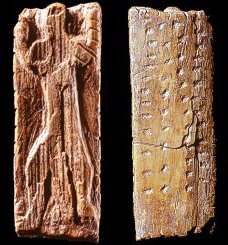
|
Te Taka-pau |
39 variants of uhi - STOLEN by
Teke from his brother Ma'eha
[E:58-64] |
|
 |
18 |
 |
13 |
 |
7 |
 |
|
Gb6-26 (229 + 179 = 408) |
Gb7-17 (99 + 99) |
Gb7-31 (4 * 53) |
Gb8-8 (11 * 11 + 99) |
|
MARCH 21 (80) |
APRIL 9 (99) |
APRIL 23 (113) |
MAY 1 (121) |
|
SIRRA H
(*0) |
ADHIL (*19) |
MIRA (*33) |
BHARANI (*41) |
|
ALCHITA (*183) |
SPICA (*202) |
KHAMBALIA (*216) |
ZUBEN ELGENUBI (*224) |
|
0h |
39 (= 3 * 13) |
 |
Moving withershins in time-space 39 + 49
right ascension days will transport us from
Zuben Elgenubi (*224) to *136 (Alcyone).
136 - 88 = 48 (twice 24) and then 365 + 48 =
413 = 14 * 29½. Anciently there were 48
constellations and these could be observed
during the nights. But 7 * 7 = 49
constellations would fit nicely with 4 * 91
= 364 days. 365 + 49 = 414 (→
Bharani).
|
 |
 |
 |
 |
 |
|
Ga7-1 |
Ga7-2 |
Ga7-3
(172) |
Ga7-4 |
Ga7-5 |
|
CLOSE
TO
THE
FULL
MOON: |
|
MARCH
9
(68) |
10 |
11
(*355) |
12 |
13
(254
-
182) |
|
No
star
listed
(52) |
ψ
Persei
(53.1)
ACRUX
(α
CRUCIS)
(235
+
183
-
365
=
53) |
δ
Persei
(54.7) |
Al
Thurayya-27
(Many
Little
Ones)
/
Krittikā-3
(Nurses
of
Kārttikeya)
/
TAU-ONO
(Six
Stones)
ATIKS
=
ο
Persei,
RANA
(Frog)
=
δ
Eridani
(55.1),
CELAENO
(16
Tauri),
ELECTRA
(17),
TAYGETA
(19),
ν
Persei
(55.3),
MAIA
(20),
ASTEROPE
(21),
MEROPE
(23)
(55.6) |
Hairy
Head-18
(Cockerel)
/
Temennu-3
(Foundation
Stone)
ALCYONE
(56.1),
PLEIONE
(28
Tauri),
ATLAS
(27
Tauri)
(56.3) |
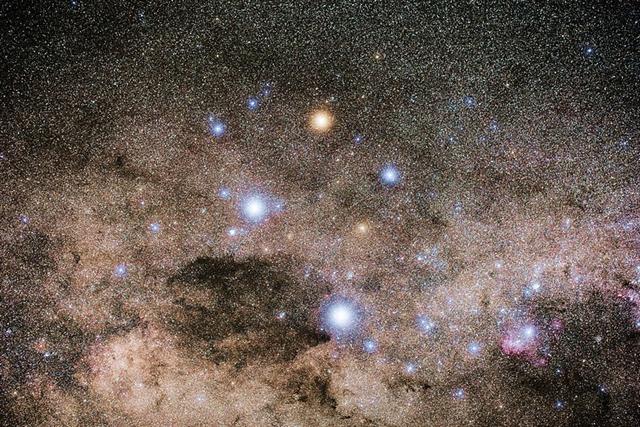 |
|
May
12 |
13
(*53) |
14
(134) |
15
(500,
erima
te
rau) |
16
(136) |
|
...
During
the
reign
of
Matua,
the
Hanau
Eepe
came
[he
ea].
They
stole
[he
toke]
one
side
(etahi
painga)
of
the
land
of
he
king
of
Hanau
Momoko
and
moved
[he
hakaneke]
the
border
[te
tita'a
koîa]
from
their
side
toward
the
side
of
the
Hanau
Momoko.
Five
hundred
[erima
te
rau]
Hanau
Eepe
stole
the
land
of
the
king
of
the
Hanau
Momoko.
[E:53].
...
'Oh,
you,
why
[mo-te-aha]
have
you
violated
[toke]
the
borders
of
my [tooku]
land?'
The
Hanau
Eepe
answered,
'There
is
not
enough
land
[he
kainga
kore]
to
live
on!'
Thereupon
the
king
called
out
[he
rangi]
to
the
Hanau
Eepe,
'Here
I
stand,
and
I
tell
all
of
you:
I am
taking
[he
too
au]
you
prisoners
[he
puru]
and
I am
locking
you
up
in
the
house
of
prisoners
(hare
kopu)
for
fifty
[50,
erima
te
kauatu]
years!'
Then
the
king
called
out
[he
rangi]
to
his
men,
'Seize
[ka
too]
all
of
them,
and
lock
up
all
of
the
Hanau
Eepe!
Lock
them
up [ka
puru]
for
good!'
[E:55
→
right
ascension
day
corresponding
to
May
15
(365
+
135
=
500)].
...
Matua
[A
Taana]
said
to
Hotu
[A
Matua],
'Take
along
the
Hanau
Eepe
and
let
them
work
the
land!'
Hotu
called
out
to
Heke:
'Go
and
bring
the
500
prisoners
on
board
the
canoe!'
He
took
all
of
them
along,
led
them
on
board
the
canoe,
and
left
them
there.
For
six
days
(po
ono),
mats
(moenga)
were
taken
on
board
the
canoe
(i.e.,
the
loading
of
the
canoe
took
six
days)
...
[E:73-74
→
Ga7-3--7-4.] |
|
E:73
→
584
/ 8
=
365
/ 5
→ 40
(February
9) +
33
(→
Mira)
...
On
February
9
the
Chorti
Ah
K'in,
'diviners',
begin
the
agricultural
year.
Both
the
260-day
cycle
and
the
solar
year
are
used
in
setting
dates
for
religious
and
agricultural
ceremonies,
especially
when
those
rituals
fall
at
the
same
time
in
both
calendars.
The
ceremony
begins
when
the
diviners
go
to a
sacred
spring
where
they
choose
five
stones
with
the
proper
shape
and
color.
These
stones
will
mark
the
five
positions
of
the
sacred
cosmogram
created
by
the
ritual.
When
the
stones
are
brought
back
to
the
ceremonial
house,
two
diviners
start
the
ritual
by
placing
the
stones
on a
table
in a
careful
pattern
that
reproduces
the
schematic
of
the
universe.
At
the
same
time,
helpers
under
the
table
replace
last
year's
diagram
with
the
new
one.
They
believe
that
by
placing
the
cosmic
diagram
under
the
base
of
God
at
the
center
of
the
world
they
demonstrate
that
God
dominates
the
universe.
The
priests
place
the
stones
in a
very
particular
order.
First
the
stone
that
corresponds
to
the
sun
in
the
eastern,
sunrise
position
of
summer
solstice
is
set
down;
then
the
stone
corresponding
to
the
western,
sunset
position
of
the
same
solstice.
This
is
followed
by
stones
representing
the
western,
sunset
position
of
the
winter
solstice,
then
its
eastern,
sunrise
position.
Together
these
four
stones
form
a
square.
They
sit
at
the
four
corners
of
the
square
just
as
we
saw
in
the
Creation
story
from
the
Classic
period
and
in
the
Popol
Vuh.
Finally,
the
center
stone
is
placed
to
form
the
ancient
five-point
sign
modern
researchers
called
the
quincunx
...
 |
|
CLOSE
TO
THE
SUN: |
|
SEPT
7
(250) |
8 |
9
(70
+
183) |
10
(135
+ 4
*
29½) |
11 |
|
NUSAKAN
(Pauper's
Bowl)
= β
Cor.
Bor.
(234.0),
κ¹
Apodis
(234.3),
ν
Bootis
(234.7),
ζ
Librae
(234.9) |
θ
Cor.
Borealis
(235.3),
γ
Lupi
(235.6),
GEMMA
= α
Cor.
Bor.,
ZUBEN
ELAKRAB
= γ
Librae,
QIN
= δ
Serpentis,
ε
Tr.
Austr.
(235.7),
μ
Cor.
Borealis
(235.8),
υ
Librae
(235.9)
SIRRAH
(α
Andromedae)
(53
+
182
=
235) |
φ
Bootis
(236.2),
ω
Lupi,
τ
Librae
(236.3),
ψ¹
Lupi
(236.7),
ζ
Cor.
Borealis
(236.9) |
κ
Librae
(237.2),
ι
Serpentis
(237.4),
ψ²
Lupi,
ρ
Oct.
(237.5),
γ
Cor.
Borealis,
η
Librae
(237.7),
COR
SERPENTIS
= α
Serpentis
(237.9)
*196.0
=
*237.4
-
*41.4 |
π
Cor.
Borealis,
UNUK
ELHAIA
(Necks
of
the
Serpents)
=
λ
Serpentis
(238.1),
CHOW
=
β
Serpentis
(238.6) |
|
Nov
10
(314
→ π) |
11 |
12
(*236
= 8
*
29½) |
13 |
14 |
|
...
In
other
words,
the
ancient
Druidic
religion
based
on
the
oak-cult
will
be
swept
away
by
Christianity
and
the
door
-
the
god
Llyr
-
will
languish
forgotten
in
the
Castle
of
Arianrhod,
the
Corona
Borealis.
This
helps
us
to
understand
the
relationship
at
Rome
of
Janus
and
the
White
Goddess
Cardea
who
is
...
the
Goddess
of
Hinges
who
came
to
Rome
from
Alba
Longa.
She
was
the
hinge
on
which
the
year
swung
-
the
ancient
Latin,
not
the
Etruscan
year
-
and
her
importance
as
such
is
recorded
in
the
Latin
adjective
cardinalis
- as
we
say
in
English
'of
cardinal
importance
-
which
was
also
applied
to
the
four
main
winds;
for
winds
were
considered
as
under
the
sole
direction
of
the
Great
Goddess
until
Classical
times
...
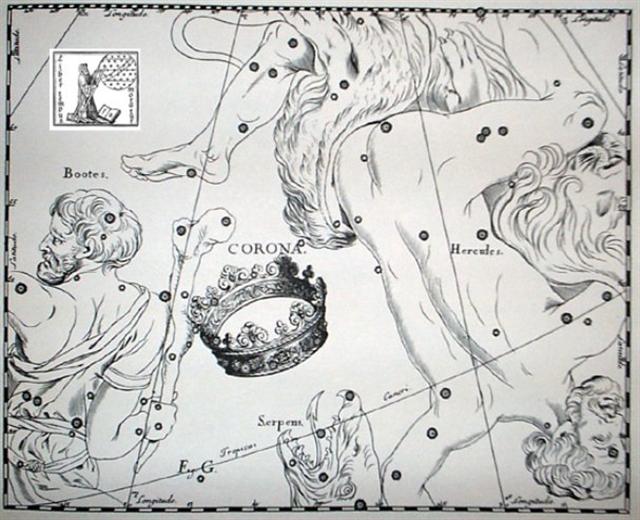 |
I.e., the
structure
documented on
the mammoth
bone seems
to
correspond
to this
structure:
|
BACK SIDE |
BORDER LINE |
FRONT SIDE |
|
 |
46 |

|

|

|
37 |

|

|
|
Ga7-5 (174) |
Ga8-18 |
Ga8-19 (222) |
Ga8-20 (223) |
Gb2-6 (9 * 29) |
Gb2-7 (262) |
|
ALCYONE (*56) |
ALHENA |
ADARA (*104) |
ALZIRR |
ALPHARD (*142) |
ALTERF (*143.4) |
|
"April 5 (460) |
"May 22 |
23 (95 + 48) |
24 (144) |
"June 30 (181) |
"July 1 |
|
49 |
39 |
89 - 88 |
|
89 → BET-EL-GEUZE |
Or maybe better:
when
counting
from
Tau-ono
at *55 (a
more
reasonable
beginning
for the Back
side) the
star Alhena
(γ Gemini,
Al-Han'ah,
the Brand) would mark
the end of
49 dark
nights. Then
would follow
39 days of
dawning from
the Virgins
(Adara, ε
Canis
Majoris),
to the
Horse
(Al-Phard, α
Hydrae) -
corresponding
to the dawnng
of the front
side.

This was
evidently a
very
important
place, we
will
remember:
|
CLOSE
TO
THE
FULL
MOON: |
|
DEC
7
(*261) |
8 |
9 (7
* 7
* 7) |
10 |
11
(345) |
12
(*266) |
 |
 |
 |
 |
 |
 |
|
Gb2-6
(9 *
29) |
Gb2-7 |
Gb2-8 |
Gb2-9
(35) |
Gb2-10 |
Gb2-11
(266) |
|
BUNDA
(Foundation)
/
KAKKAB
NAMMAΧ
(Star
of
Mighty
Destiny) |
θ
Piscis
Austrini
(330.1),
λ
Oct.
(330.7) |
|
Al
Sa'd
al
Su'ud-22
(Luckiest
of
the
Lucky)
/
Emptiness-11
(Rat)
TSIN
= 36
Capricorni
(325.2),
ALPHIRK
(The
Flock)
=
β
Cephei
(325.7),
SADALSUD
=
β
Aquarii,
ξ
Gruis
(325.9) |
No
star
listed
(326) |
CASTRA
= ε
Capricorni
(327.2),
BUNDA
= ξ
Aquarii
(327.5)
SIRIUS
(α
Canis
Majoris)
|
Mahar
sha
hi-na
Shahū-26
(Western
One
in
the
Tail
of
the
Goat)
NASHIRA
=
γ
Capricorni
(328.0),
ν
Oct.
(328.3),
AZELFAFAGE
=
π¹
Cygni,
κ
Capricorni
(328.7) |
Arkat
sha
hi-na
Shahū-27
(Eastern
One
in
the
Tail
of
the
Goat)
ENIF
(The
Nose)
=
ε
Pegasi,
ERAKIS
=
μ
Cephei
(329.2),
46
CAPRICORNI,
JIH
(the
Sun)
=
κ
Pegasi
(329.3),
ι
Piscis
Austrini
(329.4),
λ
Capricorni
(329.6),
ν
Cephei
(329.7),
DENEB
ALGIEDI
=
δ
Capricorni
(329.8)
*288.0
=
*329.4
-
*41.4 |
 |
|
Febr
9
(40) |
10 |
(343
+
64) |
(408
= 43
+
365) |
13 |
All
Hearts'
Day |
|
...
On
February
9
the
Chorti
Ah
K'in,
'diviners',
begin
the
agricultural
year.
Both
the
260-day
cycle
and
the
solar
year
are
used
in
setting
dates
for
religious
and
agricultural
ceremonies,
especially
when
those
rituals
fall
at
the
same
time
in
both
calendars.
The
ceremony
begins
when
the
diviners
go
to a
sacred
spring
where
they
choose
five
stones
with
the
proper
shape
and
color.
These
stones
will
mark
the
five
positions
of
the
sacred
cosmogram
created
by
the
ritual.
When
the
stones
are
brought
back
to
the
ceremonial
house,
two
diviners
start
the
ritual
by
placing
the
stones
on a
table
in a
careful
pattern
that
reproduces
the
schematic
of
the
universe.
At
the
same
time,
helpers
under
the
table
replace
last
year's
diagram
with
the
new
one.
They
believe
that
by
placing
the
cosmic
diagram
under
the
base
of
God
at
the
center
of
the
world
they
demonstrate
that
God
dominates
the
universe.
The
priests
place
the
stones
in a
very
particular
order.
First
the
stone
that
corresponds
to
the
sun
in
the
eastern,
sunrise
position
of
summer
solstice
is
set
down;
then
the
stone
corresponding
to
the
western,
sunset
position
of
the
same
solstice.
This
is
followed
by
stones
representing
the
western,
sunset
position
of
the
winter
solstice,
then
its
eastern,
sunrise
position.
Together
these
four
stones
form
a
square.
They
sit
at
the
four
corners
of
the
square
just
as
we
saw
in
the
Creation
story
from
the
Classic
period
and
in
the
Popol
Vuh.
Finally,
the
center
stone
is
placed
to
form
the
ancient
five-point
sign
modern
researchers
called
the
quincunx
...

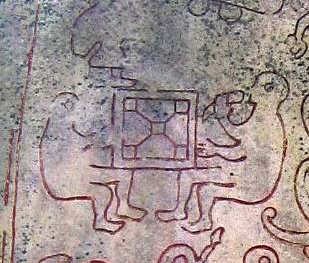
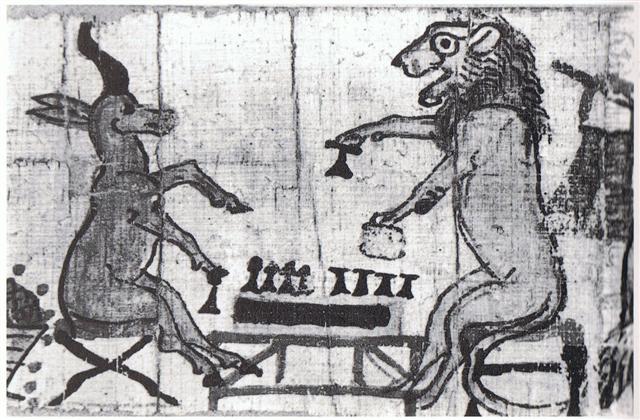 |
|
°Febr
5 |
6 |
7 |
8
(*324) |
9 |
10
(41) |
|
'Jan
13
(378) |
14 |
15
(*300) |
16 |
17 |
18
(383) |
|
"Dec
30
|
31 |
"Jan
1 |
2 |
3
(368) |
4 |
|
CLOSE
TO
THE
SUN: |
|
JUNE
7
(*78) |
8 |
9 |
10
(161) |
11 |
12 |
|
Fibonacci:
1,
1,
2,
3,
5,
8,
13,
21,
34,
55
...
→
1.618033998
...
= φ
= (1
+
√5)
/ 2.
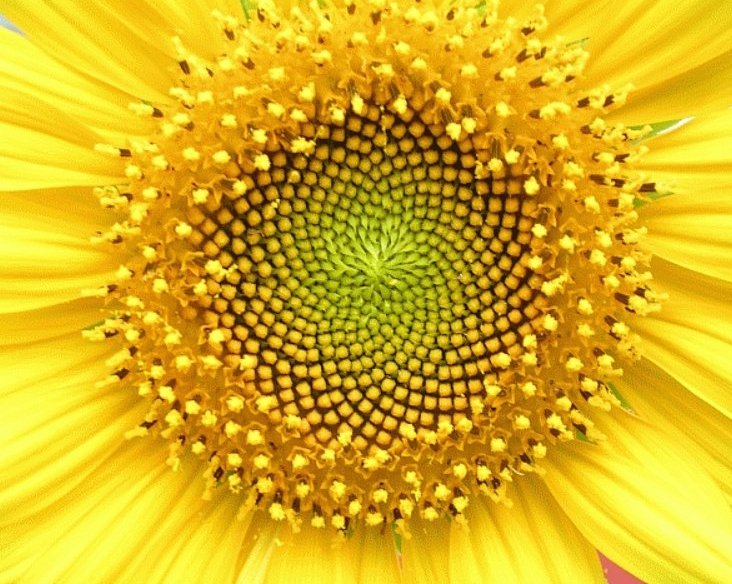
...
The
month,
which
takes
its
name
from
Juppiter
the
oak-god,
begins
on
June
10th
and
ends
of
July
7th.
Midway
comes
St.
John's
Day,
June
24th,
the
day
on
which
the
oak-king
was
sacrificially
burned
alive.
The
Celtic
year
was
divided
into
two
halves
with
the
second
half
beginning
in
July,
apparently
after
a
seven-day
wake,
or
funeral
feast,
in
the
oak-king's
honour
...
.jpg) |
|
The
Knot
(Ukdah) |
5
Imix
9
Kumk'u
Rishu
A.-13
(Head
of
the
Lion)
ψ
Leonis
(146.4),
RAS
ELASET
AUSTRALIS
= ε
Leonis
(146.6)
*105.0
=
*146.4
-
*41.4 |
VATHORZ
PRIOR
= υ
Carinae
(147.9) |
|
Star-25
(Horse)
/
ANA-HEU-HEU-PO-5
(Pillar
where
debates
were
held)
ALPHARD
(The
Horse)
=
α
Hydrae
(142.3),
ω
Leonis
(142.6),
τ¹
Hydrae
(142.7) |
Al
Tarf-7
(The
End)
ψ
Velorum
(143.3),
ALTERF
=
λ
Leonis,
τ²
Hydrae
(143.4),
ξ
Leonis
(143.5)
*102.0
=
*143.4
-
*41.4 |
A
Hydrae
(144.1)
VEGA
(α
Lyrae)
|
Creation
of
our
present
world
UKDAH
(Knot)
=
ι
Hydrae
(145.4),
κ
Hydrae
(145.5),
SUBRA
=
ο
Leonis
(145.8)
*104.0
=
*145.4
-
*41.4
ALPHEKKA
MERIDIANA |
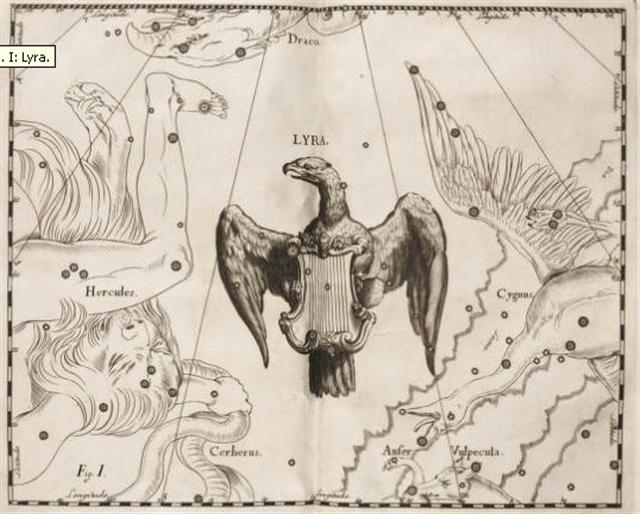 |
|
Aug
10 |
11 |
12 |
13
(*145
=
290
/ 2) |
14 |
15
(227) |
|
°Aug
6 |
7 |
8
(220) |
9
(13
*
17) |
10 |
11
(*143) |
|
'July
14 |
15 |
16 |
17
(*118
= 4
*
29½) |
18 |
19
(200) |
|
SIRIUS |
"July
1 |
2 |
3
(*104
= 4
* 26) |
4 |
5
(186) |
|
Itzam-Yeh defeated |
28 May (148), 3149 BC |
|
1st 3-stone place |
21 May (141), 3114 BC |
|
Creation of our present world |
13 August (225), 3114 BC |
|
Och ta chan (Hun-Nal-Ye 'entered or became the sky') |
5 February (36), 3112 BC |
|
21 May, 3114 BC - 5 February, 3112 BC = 542 |
|
542 'happens to be' the sum of 365 days and 6 * 29½ nights. |
.. In three magnificent texts at the site of Koba, scribes recorded it as one of the largest finite numbers we humans have ever written. According to these inscriptions, our world was created on the day 4 Ahaw 8 Kumk'u. On this day all the cycles of the Maya calendar above twenty years were set at thirteen - that is to say, the cycles of 400 years, 8,000 years, 160,000 years, 32,000,000 years, and so on, all the way up to a cycle number extending to twenty places (2021 * 1360-day year).
In our calendar, this day fell on August 13, 3114 BC. To understand what this means, we need a little scale. The thirteens in this huge number act like the twelve in our cycles - the next hour after twelve is one.
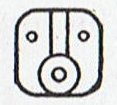
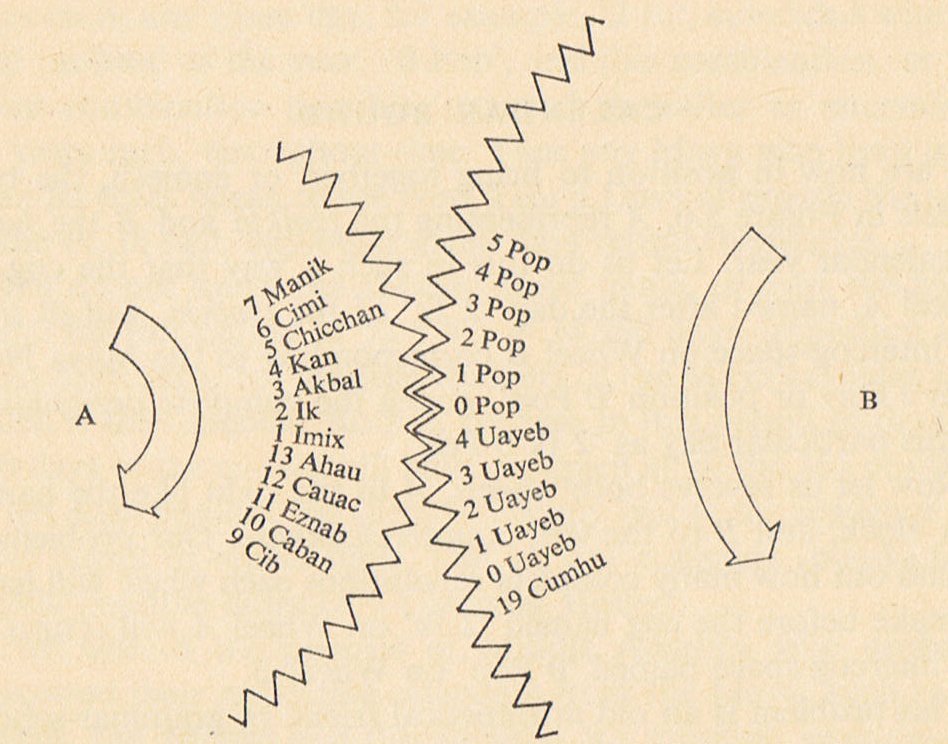
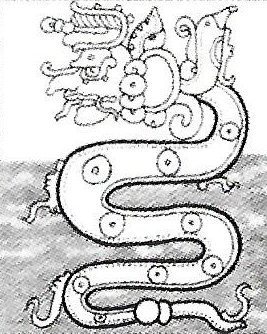
Thirteen changed to one as each of these cycles in the Maya calendar was completed, therefore, we have the following sequence:
|
13. |
13. |
13. |
0. |
0. |
0. |
1. |
5 Imix |
9 Kumk'u |
(Aug. 14, 3114 B.C.) |
|
13. |
13. |
13. |
0. |
0. |
1. |
0. |
11 Ahaw |
3 Pop |
(Sept. 2, 3114 B.C.) |
|
13. |
13. |
13. |
0. |
1. |
0. |
0. |
13 Ahaw |
3 Kumk'u |
(Aug.7, 3113 B.C.) |
|
13. |
13. |
13. |
1. |
0. |
0. |
0. |
2 Ahaw |
8 Mak |
(May 1, 3094 B.C.) |
|
13. |
13. |
1. |
0. |
0. |
0. |
0. |
3 Ahaw |
13 Ch'en |
(Nov. 15, 2720 B.C.) |
|
13. |
13. |
13. |
0. |
0. |
0. |
0. |
4 Ahaw |
3 K'ank'in |
(Dec. 23, A.D. 2012) |
|
13. |
1. |
0. |
0. |
0. |
0. |
0. |
10 Ahaw |
13 Yaxk'in |
(Oct. 15, A.D. 4772) |
|
1. |
0. |
0. |
0. |
0. |
0. |
0. |
7 Ahaw |
3 Zotz' |
(Nov. 22, A.D. 154587) |
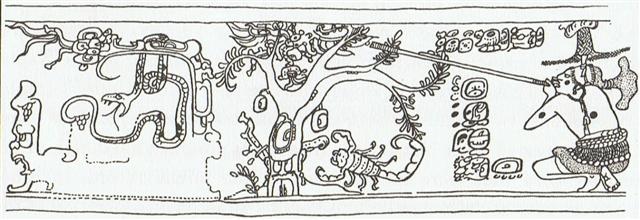
... This pot depicts one of the Hero Twins (One-Ahaw in the Classic texts and One-Hunaphu in the K'iche' Popol Vuh) and a great bird who is trying to land in a huge ceiba tree heavy with fruit. This mythical bird is Itzam-Yeh, Classic prototype of Wuqub-Kaqix, 'Seven-Macaw', of Popol Vuh fame. In that story, in the time before the sky was lifted up to make room for the light, the vainglorious Seven-Macaw imagined himself to be the sun. Offended by his pride, the Hero Twins humbled him by breaking his beautiful shining tooth with a pellet from their blowgun. This pot shows One-Ahaw aiming at the bird as he swoops down to land in his tree. As Itzam-Yeh lands on his perch, the text tells us he is 'entering or becoming the sky'.
This particular 'sky-entering' is not the one mentioned in the Palenque text. It is the final event that occurred in the previous creation before the universe was remade. Before the sky could be raised and the real sun revealed in all its splendor, the Hero Twins had to put the false sun, Itzam-Yeh, in his place. If the date on this pot corresponds to that pre-Columbian event, as we believe it does, then Itzam-Yeh was defeated on 12.18.4.5.0.1 Ahaw 3 K'ank'in (May 28, 3149 B.C.). After the new universe was finally brought into existence, First Father also entered the sky by landing in the tree, just as Itzam-Yeh did ...
|
|


















.jpg)




